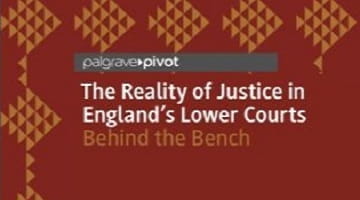Why study this course with LJMU?
- A unique degree which examines the interaction between criminal law and criminal justice disciplines
- Gives you the opportunity to assess how criminal law legislation impacts on real world criminal justice policies and practices
- Teaching from supportive, internationally recognised legal professionals and criminal justice writers and practitioners
- Work placements and voluntary work opportunities to enhance your graduate employability
- Variety of field trips and visits from local employers working in legal and criminal justice professions.
- Opportunities to study in Europe as part of the University's Erasmus / Go Global programme
- International Foundation Year course available offering direct progression onto this degree programme - visit LJMU's International Study Centre to find out more
About your course
The BA (Hons) Criminal Law and Criminal Justice programme at Liverpool John Moores University is the ideal preparation for a range of fascinating careers in both the legal and the criminal justice sectors.
Many of your tutors have professional frontline experience of working in the criminal justice system or researching law and criminal justice, with international reputations for research and writing, giving you a solid grounding in both areas.
While this course prepares you for a career in the legal profession following completion of professional training programmes for solicitors, it also develops vital personal skills in teamwork, communication, writing and time management, so that you are more than ready to face the challenges of a range of careers should you decide that law isn't for you.
We encourage you to organise a placement for your final year as it will give you vital experience of how the criminal law and criminal justice system work in practice. For the same reasons, we recommend that you undertake some form of voluntary work during your time at LJMU and/or apply to take part in the University's Study Abroad programme to see how legal systems work in another country.
As the course progresses, the modules become more focused on preparing you to work in the legal or criminal justice systems, and in your final year you will be able to specialise in the areas that interest you most, whether they be vocational or more abstract topics.
Course modules
What you will study on this degree
Further guidance on modules
Modules are designated core or optional in accordance with professional body requirements, as applicable, and LJMU’s Academic Framework Regulations. Whilst you are required to study core modules, optional modules provide you with an element of choice. Their availability may vary and will be subject to meeting minimum student numbers.
Where changes to modules are necessary these will be communicated as appropriate.
Core modules
English Legal System
20 credits
20 credits
This module aims to introduce students to the basic structures and values which drive the English legal system in practice.
Skills for Success in Law and Criminal Justice
20 credits
20 credits
This module aims to assist students in developing the knowledge and skills necessary for successful study on a programme focusing on law and criminal justice.
Human Rights, Social Justice and the Law
20 credits
20 credits
This module aims to raise student awareness of concepts, values and definitions relating to both human rights and social justice. After looking at competing definitions of human rights and social justice, the module considers how both frameworks influence English criminal law and English criminal justice, and how both could be used side-by-side to use criminal law and criminal justice as tools for building a better and fairer society.
Core modules
Professional Development in Criminal Justice
20 credits
20 credits
The aim of this module is to provide students with the ability to develop self-awareness and identify skills to improve their employability in criminal justice and allied areas. Students will also gain an understanding of the relationship between theory, policy and the experience of practice in various criminal justice agencies.
Crime, Law and Criminalisation I
20 credits
20 credits
This module is designed for students who are studying criminal law alongside criminal justice modules. It aims to provide a critical discussion and analysis of the basic substantive criminal law (in terms of relevant case and statute law), but also aims to relate the substantive criminal law to its application in the criminal justice process in practice, as well as to its socio-legal context in wider society.
Crime, Law and Criminalisation II
20 credits
20 credits
This module builds on the knowledge gained by students in previous modules by critically examining a range of specific criminal law offences and their implementation and enforcement in English criminal justice practice.
Optional modules
Study Year Abroad - Criminal Justice
120 credits
120 credits
This is an additional year of full-time study at an approved higher education institution. The modules to be studied must be agreed in advance, and must be appropriate for the student's programme of study
Victimology
20 credits
20 credits
The overall aim of this module is to develop a more meaningful understanding of victims of crime and to critically explore their role and experiences within the criminal justice system. Students will develop a critical appreciation of the conceptual development of victims and victimology as an academic discipline and also evaluate the notions of victimhood and explore challenges for victim service provision.
European Criminal Law
20 credits
20 credits
This module aims to develop student knowledge of European criminal law - its foundations, its processes and its enforcement at international and national level. Students will also be encouraged to think critically about the roles and purposes of European criminal law in an era of nationalism and Brexit.
Criminal Evidence
20 credits
20 credits
This module aims to raise student awareness of the principles and practice relating to criminal evidence, in both the legal and the criminal justice contexts.
Knowledge Production and Transfer in Criminal Justice
20 credits
20 credits
This module aims to develop students' skills in methods of producing reliable and effective knowledge relating to criminal justice, this includes:
- applying ethical principles to criminal justice research
- issues relating to the influence of research on criminal justice policy and practice
- barriers to effective knowledge production and transfer in relation to criminal justice
It provide students with an overview of the development of research and evaluation within criminal justice in the last 50 years, and why it is so important to understand the contexts and processes behind how knowledge transfers from one criminal justice community to another.
New Directions in Criminological Theory
20 credits
20 credits
This module requires students to critically consider the innovative ways in which criminology theory is used today in the policy and practice of criminal justice. Students must demonstrate an ability to build upon existing knowledge of criminological theory developed through the core Criminological Theory module at level 4 and apply those understandings to contemporary criminal justice.
The syllabus includes:
- theories and theorising - agency and structure
- criminological theories, policies and practices - from classicism and positivism through to labelling and strain theory, and their relative influences on policy and practice
- expanding the criminological imagination
- critical criminology and critical criminologies - the influence of Marxism
- new directions in criminological theory - green criminology, ultra realism, zemiology, peace-making and convict criminologies
Rehabilitation and Desistance in Criminal Justice
20 credits
20 credits
This module introduces students to the concepts of rehabilitation and desistance within the criminal justice system. It will consider the theory behind the concepts and their impact on policy and practice, regarding the Probation Service and Prison Service specifically and the criminal justice system more broadly.
Students will explore the relationship between rehabilitation. desistance, and risk assessment and management processes and practices. This includes:
- making sense of rehabilitation and desistance - terminology and definitions
- history and the context of rehabilitation and desistance in the criminal justice system
- theories of rehabilitation
- theories of desistance
- rehabilitation and desistance in the community
- rehabilitation and desistance in custody
- risk assessment and management - implications and impact
- barriers to effective rehabilitation and desistance
An Introduction to Penology
20 credits
20 credits
This module allows you to pursue a more in-depth study of two of the main criminal justice institutions, Prison and Probation services. The design and delivery surrounding their administration has remained the subject of intense debate and controversy throughout their history. Therefore, you will be encouraged to critically engage with these debates taking into consideration the theory, policy, and practice which surrounds community and custodial interventions.
Core modules
Criminal Justice Futures: Employability Skills for the Workplace
20 credits
20 credits
This module implements LJMU's employability strategy by delivering work-based learning to students which relates to their academic studies and their onward employability plan, thereby allowing them to develop examples of skills development and learning with a live employer-driven brief.
Optional modules
The Criminal Courts - The Search for Equity and Justice
20 credits
20 credits
This module will enable students to think critically about the criminal courts in England and Wales - where they came from, how they operate, why they operate in the ways in which they do, and how they could be enabled to operate more fairly and justly in the future.
Terror and Terrorism: A Critical Exploration
20 credits
20 credits
This module will allow students to develop a critical understanding of terror and terrorism, both in terms of its history, contemporary manifestations, and likely forward trajectory. As a level 6 module it will allow students to build on their critical engagement with key concepts, legislation, regulation and operational realities within the wider criminal justice system, both from UK specific and global perspectives.
This includes:
- the contested terrain of defining terror
- the intellectual traditions of terror and terrorism
- religiously and politically inspired terror
- organisational models of terrorism
- state terror and terror by proxy
- psychology of terror (the terrorist)
- psychology of terror (the victims of terror)
- geo-politics of terror
- the economics of terror
- emerging technologies and terror
- responses to terror: attacking the causes, or liquidating terrorists and terrorist organisations?
- does the concept and laws regarding Human Rights have any purchase in the world of terror and counter terror?
Contemporary Issues in Prisons and Probation
20 credits
20 credits
The aim of this module is to enable you to develop your learning and understanding of penology building on the Penology module at level 5. You will be given the opportunity to critically evaluate and consider contemporary issues in penology with a clear focus on the theory, policy and practice which surrounds community and custodial interventions. Specific consideration will be given to the tensions, dilemmas and critiques which surround the delivery of interventions with those individuals who present complex needs.
Youth Justice
20 credits
20 credits
This module will provide students with a critical understanding of the position of youth in society today, the relationship between youth and crime, and the range of ways in which criminal justice responds to youth crime in England and Wales. It will provide students with knowledge of the past and current policy and legislation relating to young people. Students will have the opportunity to develop practice skills of assessing seriousness, suitability and risk assessment in relation to offences and sentences for young people, as well as oral presentation skills by preparing and completing the module's assessed presentation.
Substance Use, Society and Criminal Justice
20 credits
20 credits
This module aims to provide students with a broad understanding of the sociocultural place of substance use. It will investigate different paradigms and perspectives on substance (mis)use and explore relevant drug policy. The module will also seek to provide a comprehension of how we practically respond to substance use via treatment interventions.This module attempts to critically deconstruct the role and place of substance use in contemporary society. Furthermore it will provide an analysis of the legitimacy of drug policy and the efficacy of interventions with substance (mis)users.
International Criminal Law and State Crime
20 credits
20 credits
This module develops student awareness of international criminal law: its historical development, its principles of criminal responsibility, and its direct and indirect enforcement, using the development of the International Criminal Court as a focus and case study.
Criminal Advocacy
20 credits
20 credits
This module aims to build students' employability skills in relation to negotiation and mediation as an alternative to formal court processes, and in relation to arguing appeal cases in court through the processes of mooting.
Advanced Criminal Law: Theory and Practice
20 credits
20 credits
This module aims to give students who are already familiar with the general and specific part of criminal law a deeper, more theoretically-informed understanding of the values and principles driving criminal law, which influence criminal law's past, present and future.
Your Learning Experience
Excellent facilities and learning resources
We adopt an active blended learning approach, meaning you will experience a combination of face-to-face and online learning during your time at LJMU. This enables you to experience a rich and diverse learning experience and engage fully with your studies. Our approach ensures that you can easily access support from your personal tutor, either by meeting them on-campus or via a video call to suit your needs.
Teaching is via a combination of lectures, smaller student-led tutorials, online activities, hands-on practical experience and private study.
Work-related Learning
This highly vocational course is designed to enhance your employability by incorporating hands-on practical experience and work-related modules at every level. We also strongly encourage you to seek out voluntary work at all stages of the programme, as the experience will significantly enhance your CV and put you in a strong position once you start to compete on the open job market. A member of staff will advise you about specific work-related opportunities and act as a link mentor, liaising with local organisations on your behalf.
The course contains a number of modules that focus specifically on the skill sets that employers value, not just in the legal professions but in other careers as well. Communication, writing and organisational skills are all assets that will help you stand out from the crowd.
Dedicated personal tutor, plus study skills support
Our staff are committed to ensuring you get the most out of your three years at LJMU and encourage you to come to them for advice and guidance. For example, your personal tutor and module leaders will meet with you one-to-one to discuss personal or course-related issues.
There is plenty of support available throughout the assessment process too. On top of the support offered by academic staff, you will be given written guidelines, hints and tips and there will be revision and recap sessions for all modules as well as study support classes.
Assessment varies depending on the modules you choose, but will usually include a combination of exams and coursework.
We acknowledge that every student is unique and may perform differently depending on how they are assessed, so we allow you to choose assessments tailored to your own individual strengths. Once you have completed an assessment, feedback is given within three working weeks, so you can promptly discuss your marks with your tutor and establish where you are performing well and areas for improvement.
Where you will study
What you can expect from your School
Based within the John Foster Building, in the Mount Pleasant Campus, the School of Justice Studies is a leading provider of education in Policing Studies, Criminology and Criminal Justice. We provide specific training for policing students wishing to enter the service as a graduate recruit. The John Foster Building has many outstanding facilities, including well-equipped IT Suites, a light-filled Student Common Room and dedicated study areas. At the back of the John Foster Building is the Aldham Robarts Library, which gives access to an exceptional range of materials to support your studies.
Course tutors

Dr Noel Cross
- Programme leader
Noel has worked at LJMU for 22 years now, having joined as a Senior Lecturer in Criminal Justice in September 2002, before becoming Principal Lecturer and Programme Leader in Criminal Justice in April 2011, and then Senior Lecturer and Programme Leader in November 2019. Prior to joining LJMU, Noel worked as a research assistant and assistant lecturer at the University of Wales Swansea (now Swansea University) during his doctoral studies in the field of bail support services for young people involved in the youth justice process. Drawing on his previous academic experience of studying criminal law as part of my undergraduate degree, he has taught a module comparing criminal law and criminal justice to students on Criminal Justice programmes for 14 years now, and has also published two textbooks on this subject as an extension of the themes which form part of the teaching on this module. Noel has also taught a variety of other modules while at LJMU, often focusing on what he sees as being particular challenges to the criminal law in terms of how it is applied in criminal justice practice (for example, youth justice and the special treatment which young people accused of crime are and should be entitled to by the law; and crimes of the powerful, which often involve internationally-orientated group criminal activity of various kinds and/or crime which can be hidden by social power, rather than isolated and publicly visible individual wrongdoing). Noel remains very interested, in both teaching and research terms, in how the criminal law is applied in criminal justice practice, and in philosophical debates on the form and functions of criminal law.
-
 Lecturer/Senior Lecturer
Lecturer/Senior Lecturer


The BA Criminal Law and Criminal Justice programme is unique among English universities. It focuses purely on the criminal law and how that criminal law is enforced in practice, both nationally and internationally – and you’ll get the chance not only to learn about criminal law and criminal justice, but apply your learning on study trips to the Supreme Court in London, and the International Courts of Justice in the Hague, as you move through your programme. The programme also offers direct entry to solicitor training via the SQE, and entry to barrister training via a conversion course followed by the BPTC.
Career paths
Examples of careers our recent graduates have entered are:
- solicitor
- local authority legal adviser
- media-related work
- various legal roles in the private business sector
- police officer
- police community support officer
- trainee probation officer
- probation service assistant
- arrest referral and bail support team worker
- drug and alcohol support worker
- Prison Service (including prison warden, education officer, drugs support officer)
- social work, youth work (and working with young offenders)
- and victim/witness support worker
Student Futures - Careers, Employability and Enterprise Service
A wide range of opportunities and support is available to you, within and beyond your course, to ensure our students experience a transformation in their career trajectory. Every undergraduate curriculum includes Future Focus during Level 4, an e-learning resource and workshop designed to help you to develop your talents, passion and purpose.
Every student has access to Careers Zone 24/7, LJMU's suite of online Apps, resources and jobs board via the LJMU Student Futures website.
Tuition fees and funding
- Home full-time per year:
- £9,535
Fees
The fees quoted above cover registration, tuition, supervision, assessment and examinations as well as library membership and student IT support with access to printed, multimedia and digital resources including programme-appropriate software and on campus Wi-Fi.
Financial Support
The University offers a range of scholarships to support students through their studies. You'll find all the information you need on our specialist funding pages, including details of the Student Support Fund and other activities to support with the cost of living.
Additional Costs
In addition to fees, students should also keep in mind the cost of:
- Accommodation
- Travel costs including those for placements, visas and travel for studying abroad and field trips unless paid for by LJMU
- Stationery, IT equipment, professional body membership and graduation gown hire
The University reserves the right to increase tuition fees in accordance with any changes to the maximum allowable fees set by the UK Parliament. In the event of such a change, any fee increase will be subject to a maximum cap of 10% of the total course cost as originally stated at the time of your offer.
- International full-time per year:
- £17,750
International Scholarships and payment plans
Liverpool John Moores University is committed to supporting international students by providing a range of scholarships and flexible payment plans to help students manage their tuition fees.
Scholarships
LJMU provides a variety of undergraduate scholarships to support international students. Scholarships are available to self-funded students who have accepted their offer and met all the conditions outlined in their offer letter. Students must also demonstrate that they can cover living costs, travel, and other expenses associated to studying at the university.
All self-funded international students are eligible for an automatic scholarship worth up to £4,000. For more details and to view our full list of scholarships, visit the international scholarship webpages.
Deposit
All students must pay a £5,000 deposit before they can receive their CAS letter.
For more information view our deposit page.
Tuition Fee Payment Plan
After paying their £5,000 deposit, students have the option to pay their fees in full or in three equal instalments minus any internal scholarships and discounts. There are two payment options available for international students. You can either pay your tuition fees in full before enrolment or opt for a payment plan. With the payment plan, you can pay your fees in three instalments after making your £5,000 deposit. The first instalment is due before enrolment.
All payments should be made through Flywire. Full details can be found in the How to Pay Guide.
Early Bird Tuition Fee discount
We are excited to introduce a £500 Early Payment Discount to all self-funded international students. Eligible self-funded students who pay their fees by the required deadlines will get a discount which will be automatically deducted from the 1st year of tuition fees.
To see the required deadlines please visit the webpage
Entry requirements
Please choose your qualifications below to view requirements
Grades/points required from qualifications: BBB - ABB (120 - 128)
Work out how many UCAS points your qualifications are worth by visiting the UCAS Tariff Calculator.
Qualification requirements
GCSEs and equivalents
Grade 4 or grade C or above in English Language and Mathematics/ Numeracy.
GCSE Equivalences accepted:
• Key Skills Level 2 in English/Maths
• NVQ Level 2 Functional skills in Maths and English Writing and or Reading
• Skills for Life Level 2 in Numeracy/English
• Higher Diploma in Maths/English
• Northern Ireland Essential Skills Level 2 in Communication or Application of Number
• Wales Essential Skills Level 2 in Communication or Application of Number
A levels
BBB - ABB
Minimum Number of A Levels: 2
Maximum AS UCAS Points: 20
BTECs
Extended Diploma: DDM
Access awards
Acceptable on its own and combined with other qualifications
Pass overall with a minimum of 120 points
International Baccalaureate
Acceptable on its own and combined with other qualifications
OCR Cambridge Technical
Extended Diploma: DDM
Irish awards
Acceptable on its own and combined with other qualifications
T levels
Acceptable on its own and combined with other qualifications.
You need to obtain the required UCAS points from a related subject area.
International requirements
IELTS
6.0 overall with no component below 5.5, taken within two years of the course start date.
https://www.ljmu.ac.uk/study/courses/international-entry-requirements
Other international requirements
International applications will be considered in line with UK qualifications.
Please Note: All international qualifications are subject to a qualification equivalency check.
How to apply
Securing your place at LJMU
UCAS is the official application route for our full-time undergraduate courses. Further information on the UCAS application process can be found here https://www.ljmu.ac.uk/study/undergraduate-students/how-to-apply.
We are looking for students who are keen to learn new skills and develop those they already possess.
Your personal statement should be concise and to the point.
We want to see a systematic approach behind your submission with evidence that you have organisational ability.
Explain why you want to study the course, show you've done some research into it and be aware of the career pathways.
Work experience or contact with the legal system would be advantageous along with individual achievements.
Your university life
From accommodation and academic support to clubs and societies. Find out what LJMU has to offer.
Related Links
Talk to our students
Connect with a current LJMU student for advice and guidance on university life, courses and more.
See what our students are saying
At LJMU we want you to know you're making the right choice by studying with us. You can see what our students are saying about their experience with us via the following websites:
Related Links
News and views
Browse through the latest news and stories from the university










The university reserves the right to withdraw or make alterations to a course and facilities if necessary; this may be because such changes are deemed to be beneficial to students, are minor in nature and unlikely to impact negatively upon students or become necessary due to circumstances beyond the control of the university. Where this does happen, the university operates a policy of consultation, advice and support to all enrolled students affected by the proposed change to their course or module.
Further information on the terms and conditions of any offer made, our admissions policy and the complaints and appeals process.


















